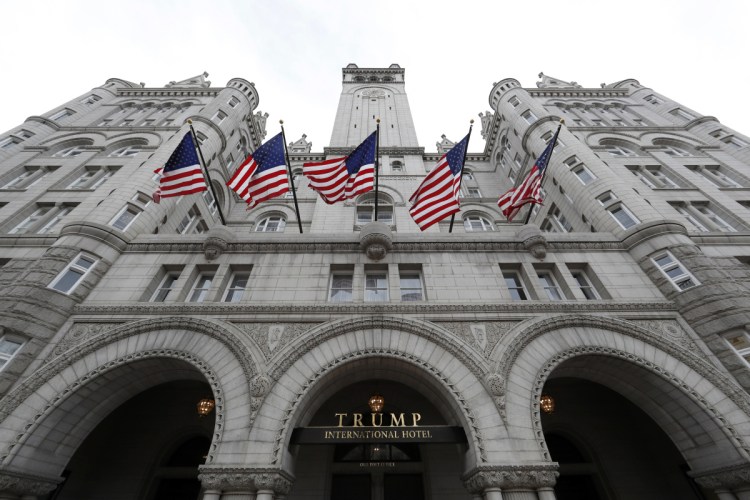A federal judge on Friday denied President Trump’s request to stay a lawsuit alleging he is in violation of the Constitution by doing business with foreign governments, a decision that paves the way for plaintiffs to seek information from his business as it relates to his D.C. hotel.
U.S. District Judge Peter J. Messitte in Greenbelt, Md., denied the Justice Department’s request that he pause the case in order to allow a higher court to intervene. And he sharply questioned the president’s position that his business does not improperly accept gifts or payments — called emoluments — as defined by the Constitution.
Plaintiffs in the suit cited visits by Maine Gov. Paul LePage to the Trump International Hotel first revealed by the Portland Press Herald after a public records request for travel receipts as an example of how Trump may have received a financial benefit from another government figure.
By Trump’s analysis, Messitte wrote, the term emoluments is the subject of such “substantial grounds of disagreement” that payments his business received from foreign governments could not qualify. The judge did not agree: “The Court finds this a dubious proposition.”
Messitte ordered the plaintiffs, the attorneys general for D.C. and Maryland, to submit a schedule for discovery — the process of producing evidence for the case — within 20 days.That decision is subject to appeal.
The judge previously limited discovery to information related to the president’s D.C. hotel.
A spokeswoman for the Justice Department did not immediately return a request for comment.
This is the second civil case in which Trump’s business is now subject to discovery, after Trump agreed Tuesday to produce portions of his calendar from 2007 and 2008 in a defamation lawsuit brought by former “Apprentice” contestant Summer Zervos.
Trump still owns his company, although he says he has stepped back from day-to-day control.
The Trump Organization has held several large events paid for by foreign governments at Trump’s D.C. hotel and reported about $150,000 in what it called “foreign profits” last year.
The Constitution bars federal officials from taking emoluments from any “King, Prince, or Foreign State.” The Founding Fathers’ intent had been to stop U.S. ambassadors overseas — emissaries from a new, poor, fragile country — from being bought off by jewels or payments from wealthy European states.
Send questions/comments to the editors.



Success. Please wait for the page to reload. If the page does not reload within 5 seconds, please refresh the page.
Enter your email and password to access comments.
Hi, to comment on stories you must . This profile is in addition to your subscription and website login.
Already have a commenting profile? .
Invalid username/password.
Please check your email to confirm and complete your registration.
Only subscribers are eligible to post comments. Please subscribe or login first for digital access. Here’s why.
Use the form below to reset your password. When you've submitted your account email, we will send an email with a reset code.